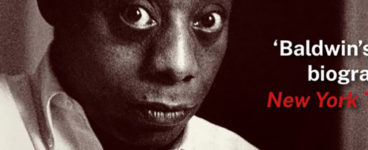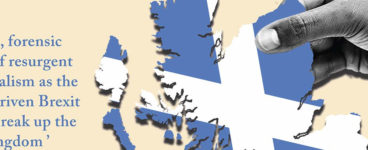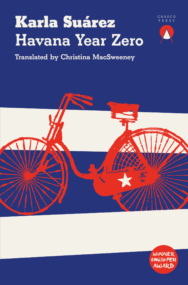‘But they lie, the history books lie, said Euclid, opening the folder to show me its contents.’
2021 looks to be another year of fantastic releases from the wonderful Charco Press. Their first publication of the year, Havana Year Zero follows Julia and her former lover Euclid as they set out to prove that the telephone was invented by Antonio Meucci in Havana, convinced it is will turn both their lives around and give Cuba a purpose once more. We hope you enjoy this opening extract.
Extract taken from Havana Year Zero
By Karla Suárez
Published by Charco Press
It all happened in 1993, year zero in Cuba. The year of interminable power cuts, when bicycles filled the streets of Havana and the shops were empty. There was nothing of anything. Zero transport. Zero meat. Zero hope. I was thirty and had thousands of problems. That’s why I got involved, although in the beginning I didn’t even suspect that for the others things had started much earlier, in April 1989, when the newspaper Granma published an article about an Italian man called Antonio Meucci under the headline ‘The Telephone Was Invented in Cuba’. That story had gradually faded from most people’s minds; they, however, had cut out the piece and kept it. I didn’t read it at the time, which is why, in 1993, I knew nothing of the whole affair until I somehow became one of them. It was inevitable. I’m a mathematician; method and logical reasoning are part and parcel of my profession. I know that certain phenomena can only manifest themselves when a given number of factors come into play, and we were so fucked in 1993 that we were converging on a single point. We were variables in the same equation. An equation that wouldn’t be solved for many years, without our help, naturally.
For me, it all began in a friend’s apartment. Let’s call him… Euclid. Yes, if it’s all right with you, I’d prefer not to use the real names of the people involved. I don’t want to hurt anyone’s feelings. So Euclid is the first variable in that damned equation.
When we reached his place in the afternoon, his mom greeted us with the news that the pump had broken down again and we’d have to fill the storage drums using buckets of water. My friend scowled, I offered to help. So that’s what we were doing when I recalled a conversation that had taken place during a dinner a few days before, and I asked him if he’d ever heard of someone called Meucci. Euclid put down his bucket, looked at me and asked if I meant Antonio Meucci. Yes, of course he knew the name. He grabbed my bucket, poured the water into the drum and informed his mother that he was tired and would finish the task later. She protested, but Euclid turned a deaf ear. He took my arm, led me to his room, switched on the radio – his usual practice when he didn’t want to be overheard – and tuned in to CMBF, the classical music station. Then he asked for the full story. I told him what little I knew, and added that it had all started because the author was writing a book about Meucci. An author? What author? he asked gravely, and that irritated me because I didn’t see the need for so many questions. Euclid got to his feet, went over to the wardrobe and returned with a folder. He sat down next to me on the bed and said: I’ve been interested in this story for years.
And then he began to explain. I learned that Antonio Meucci was an Italian, born in Florence in the nineteenth century, who had sailed to Havana in 1835 to work as the chief engineer in the Teatro Tacón, the largest and most beautiful theatre in the Americas at the time. Meucci was a scientist with a passion for invention who, among other things, had become interested in the study of electrical phenomena – it was known as galvanism in those days – and their application in a variety of fields, particularly medicine. He’d already invented a number of devices and was in the middle of one of his experiments in electrotherapy when he claimed to have heard the voice of another person through an apparatus he’d created. That’s the telephone, right? Transmitting a voice by means of electricity.
Well, he took this thing he called the ‘talking telegraph’ to New York, where he continued to perfect his invention. Some time later he managed to get a kind of provisional patent that had to be renewed annually. But Meucci had no money, he was flat broke, so the years passed and one fine day in 1876 Alexander Graham Bell, who did have cash, turned up to register the full patent for the telephone. In the end it was Bell who went down in the history books as the great inventor, and Meucci died in poverty, his name forgotten everywhere except in his native land, where his work was always recognised.
But they lie, the history books lie, said Euclid, opening the folder to show me its contents. There was a photocopy of an article, published in 1941 by the Cuban anthropologist Fernando Ortiz, which mentioned Meucci and the possibility that the telephone had been invented in Havana. In addition, there were several sheets of paper covered in notes, a few old articles from Bohemia and Juventud Rebelde, plus a copy of Granma from 1989 with that article I just mentioned.
I was fascinated. In spite of the fact that, so long after the events recounted in the documents, I was still unable to enjoy the advantages of a functioning telephone at home, I felt proud just knowing that there was a remote possibility that it had been invented in Cuba. Incredible, right? The telephone, invented in this city where telephones hardly ever work! It’s as if someone had come up with the idea of the electric light, satellite dishes or the Internet here. The ironies of science and circumstance. A dirty trick, like the one played on Meucci, who, over a century after his death, was still a forgotten figure because no one had managed to prove that his invention had preceded Bell’s.
A dreadful historical injustice, or something like that, was what I exclaimed the moment Euclid finished his exposition. That was when I learned the other thing. Euclid rose, stepped back a few paces, looked me in the eyes and said: Yes, an injustice, but one that can be righted. I didn’t understand. He sat down again, clasped my hands and, lowering his voice, added: What can’t be demonstrated doesn’t exist, but the proof of Meucci’s precedence and, ergo, its demonstration, does exist, and I know because I’ve seen it. I can’t even imagine the expression on my face; I only remember that I made no reply. He freed my hands, never taking his eyes from mine. I guess he was expecting a different reaction, waiting for me to jump up, perhaps, cry out in surprise or something, but my only feeling was curiosity, and that’s why, in the end, I simply asked: The proof?
Havana Year Zero by Karla Suárez is published by Charco Press, priced £9.99.
ALSO IN THIS ISSUE

 Talking at the Gates: James Campbell on James Baldwin
Talking at the Gates: James Campbell on James Baldwin
‘He had the most extraordinary eyes I’ve ever seen. When he had completed his instant X-ray of my br …

 David Robinson Reviews: How Britain Ends
David Robinson Reviews: How Britain Ends
‘This is a consistently thought-provoking and well-argued book, and yet the more I read it, the more …













